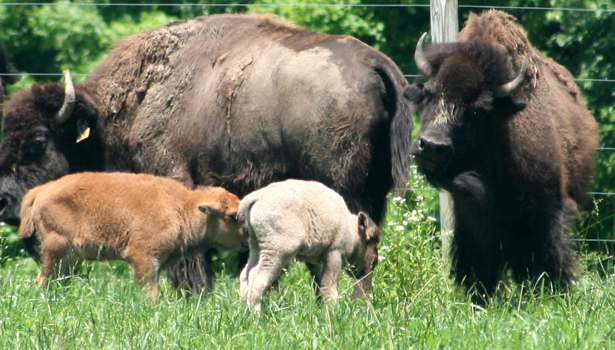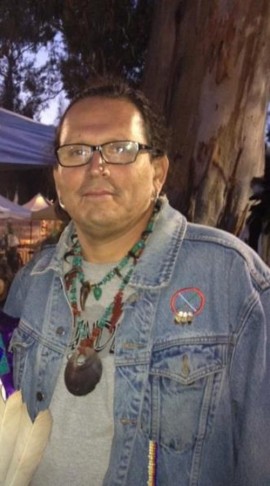
Lakota Medicine Man Steve Stonearrow traveled to northwestern Connecticut along with a group of Lakota elders to perform a naming ceremony for a white buffalo born June 16. This interview took place the night of July 29, the day after Stonearrow named the white buffalo Yellow Medicine Dancing Boy in ceremony.
How and why did you become a medicine man?
How and why are really hard questions because you don’t become
one, you’re born that way. In Lakota culture, men follow a
lineage system; their ancestors are medicine people, they become
medicine people. I didn’t come to this till late in life after a
couple of stays in federal prison, including one long stay where
I began to learn these ways. You’re given a choice to become a
medicine person by the spirits and you’re only given the choice
once. They never come back and ask you again.
They ask you?
They ask you if you want to accept this (responsibility). The
spirits that work with us in a good way are not invasive. They
don’t come unless asked and they don’t make you do anything
without asking you first, because it’s a choice. So I was asked.
I took it to my cousin’s altar and he verified what they wanted
and I accepted that responsibility at the age of 46. I’m 50 now.
How did you know what to do in terms of particular
ceremonies and knowledge of healing medicine?
I am a heyoka medicine person and in Lakota heyoka is translated
as is sacred clown. The sacred clown in our tradition is the
person who is upside down, sideways, backwards, goes against the
norm and is there to help the people see themselves. He’s the
mirror of the people but his teachers are the Thunder Beings,
his teachers are spirits. In Lakota thought, all ceremony comes
from the west where the Thunder Beings live and they give us
ceremony. So each medicine person is given his own ceremony
through dreams, visions, vision quests, sweat lodge, and sun
dance. There’s a progression, You have to start sweating and you
have to come into the caretakership of a chunupa, a pipe. From
there you go on vision quests and then you start to sun dance.
I’ve yet to meet a medicine man who is not a sun dancer. And
once you become a medicine man, a healer, then you have your own
ceremonies. So I have my own ceremonies. I have my own
particular brand of healing ceremonies, I have a sun dance, I
have a children’s dance that I take care of. They’re not mine.
Do you have a day job or do you do this all the time?
This is all that I can do. I see around 100 people a year and 95
percent of them are women and 90 percent of them are abused in
some way who need healing, Last year I traveled 50,000 miles.
People get caught up in the idea that a medicine man is this
other worldly being or as my friend Ed here says, as a kind of
rock star. But people who know, know that the medicine man is
someone who knows how to open the door to the spiritual realm.
I know medicine men here in the east whose traditions
are different.
They should be different because people have differences in
where you live, in different spirit helpers. In the Lakota
tradition I am given many ceremonies to take care of.
And do you pass them on?
Maybe. I’m teaching my daughter but in our tradition women tend
not to become medicine women until after their moon cycle stops.
Is (Lakota elder) Marian White Mouse a medicine
woman?
No, she’s a spiritual leader. And in our language she’s known as
a winunhcala, which is a term of respect. She’s chosen.
You don’t become a leader in our culture unless people chose to
follow you! There’s the story about the chief who was bad and he
woke up in the morning and his whole village was gone because
the people decided when he went to bed that they weren’t
following him anymore. In Lakota belief, you follow someone that
you trust, you follow someone whose medicine you believe in.
That’s why there are so many altars, so many different medicine
people because you do not have to be stuck with one medicine
man. If you don’t like him you are free to go find someone that
you believe in and that you want to be part of. I would never
say that (another medicine man) is doing something in a wrong
way, I’d say he’s doing something in a different way. So when
you go to different altars they should be different. When you
start to see altars that are all the same, somebody’s not
following their dream.
Do you see that often?
I see that in a lot of places — people not following their
dream. They see something somewhere and they pick it up and take
it as their own. As a medicine person you’re given dreams and
visions for each of your ceremonies and how they should be
conducted and how they should look in the smallest detail.
It felt like I was putting my life in your hands when
I went into the sweat lodge and into the lowampi.
In a way you are. You know, people very seldom die in the sweat.
What about the guy in Sedona, Arizona who killed those people?
People want to talk about Sedona, Arizona, and the man (James Arthur Ray) who caused three people to cross over through his ignorance and his altered belief system. People are so hungry for these ways that they want to jump in with anyone who claims to have any knowledge. But where we come from, in order to become a sun dancer or a spiritual leader or a medicine man, whatever you become comes through the knowledge and the experience of “pouring lodges.” I’ve been pouring lodges for over 20 years. Pouring lodges – running the ceremony.
Does your authority to do that comes from your
relationship with the spirits?
I don’t call it authority, I call it permission. Because anyone
can go into this lodge and pour a lodge – you could do it — but
are you going to run a ceremony?
No, I’d run a sauna if it was me. . .
The certain knowledge that you acquire comes through being a in
relationship with spiritual helpers – that’s what a medicine man
is made of — the helpers that surround him spiritually, that’s
where all his knowledge comes from, where his protection comes
from, where ceremonies come from – everything that he knows
comes from the spirits. And he’s entrusted – the good ones I
know — to be a human being who has no prejudices, no
discrimination, no racism. They see all people as equal
regardless of who they are. We’re humble people. We love to
laugh at ourselves and to make the peoples laugh. We’re not
about laughing at people we’re about laughing with people
Are sweat lodges ever bad?
If they’re run in a bad way or if someone with medicine they’re
not using in the right way goes in there. The guy in Sedona –
that was a tragedy. He helped people pass over in a bad way. He
had no experience, he didn’t know what he was doing, put them in
a lodge that had that black plastic underneath and when the
steam hit the black plastic it released vapors that were toxic
and that’s what sent people on the other side. So now he’s in
prison. And those people paid $9600 apiece for a weeklong
seminar on how to become a spiritual warrior! The man wasn’t
Lakota. What he did have was Oprah Winfrey’s book club. He was
on Oprah Winfrey’s show more than once. She believed him up
until he killed people.
The sweat is the first ceremony. So before you do any other
ceremony you have to have a sweat – so if we do lowampi or
sundance – we sweat in the morning, we sweat at night. Before
any major undertaking, we want to go and purify ourselves
That’s what it is, right, a purification, a
preparation, not in and of itself a ceremony for a particular
purpose?
It’s a purification ceremony. The first round is purification,
the second round is prayer, third round is pipe round, the
fourth is the going out. There are four doors, four directions,
four ages of man – four is a sacred number. And we prepare our
mind, our body, our spirit and our emotions to go forward into
whatever ceremony we’re about to undertake in a good way.
Because the sweat is a place where you drop it, you let go of
what you have, you don’t have to carry it any more when you go
into the lodge. In the lodge you are given the ability to let go
and be forgiven for everything you’ve done till that moment – if
you believe in the lodge. You come out a new human being, if
that’s what you believe.
Maybe even if it’s not what you believe!
You can come out altered, you can come out with a clean slate.
That’s not to say I’m going to run out and do bad things and
think that the lodge is going to clear them because as common
human beings we are going to make mistakes that we will hold
ourselves accountability for. The lodge is the place to let go
of them. The lodge is the womb of the earth and in the
metaphysical thought, the lodge is a round (sphere) so half of
it is underground.
Have you had people come in who’ve had a bad
experience?
They wanted to have a bad experience. Releasing negative
emotions is not a bad experience. They had a preconceived notion
that nothing could take care of whatever was affecting them. And
they come in and they struggle with the heat and they struggle
with the steam. So if you have people who are really struggling,
you can use your medicine and your knowledge to help them and
bring everyone out. My goal has always been whoever comes in the
lodge with me is going to go out the lodge with me. You have to
adjust the lodge to the person with the least experience and
work from there. There are some of us who’ve been sweating for
15, 20 years and we can sit in that thing till it melts your ear
off, but if your prayer is strong it’s okay. It’s not a test of
endurance, it’s not a test of strength, and it’s not a test of
my spiritual power or my ability to withstand heat. It’s a place
for me to pray in a safe comfortable way and to know I will not
be judged. That’s why it’s dark. I can’t see anyone, so who do I
have to rely on? No one except my connection with spirit. Also,
if you’re black, red, yellow, white or blue – I think they’re
called smurfs – I don’t see your color either, it doesn’t make a
difference.
Lakota people have managed to sustain these
traditions through a lot of hardship.
They took everything from us – they took our land and
put us on reservations, they killed our leaders and our people,
they took our language, our ceremonies, but they couldn’t get
rid of us or kill our spirituality. Lakota people are resilient.
We still have our ceremonies and our prayers and spirituality.
We’re still here.
What do you think would happen if Lakota people
didn’t do ceremony?
Our people would die. My Lakota people would die and that would
be a very sad thing.
© 1998 - 2012 Indian Country Today. All Rights Reserved To subscribe or visit go to: http://www.indiancountry.com
